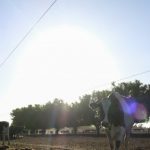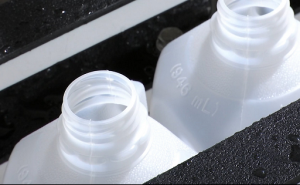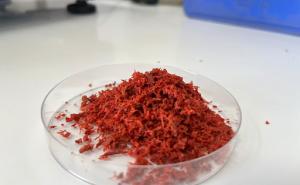
Smith was once one of the most successful dairy farmers in the state, but his health forced him out of business in 2000.
Not only are dairy farms on the decline, but grain silos are quickly disappearing as well.
Now, Smith’s small herd of milk cows are gone, and about a week ago, the three silos that once held the feed crops his family raised disappeared from the landscape with a rumble and cloud of dust.
Without use and maintenance, the towering symbols of farming life began to break down, and the Smith family was concerned someone could get hurt if the tear-down was not a controlled operation.
For Smith’s daughters — Donna Wilson, Helen Hennon and Christin Smith — part of their childhood disappeared.
Watching the concrete structures and feeling the earth rumble as they fell was a bittersweet moment for all. For Smith, 73, the demolition was also emotional as he recalled the work he and his late wife, Carolyn Smith, put into the farm.
They were once a power team in the dairy business in and around Washington County. Both received numerous awards through the four decades the dairy operated.
Smith recalled that first milk check.
After paying the bills, he had $30 to live on for the next two weeks. But that didn’t deter the Smiths. They just kept trudging along and growing the farm as their family grew.
“Mama was right there in it all,” Wilson said recently. Smith and the girls all remember the hard work that went into running a dairy farm.
“We started at 5 every morning, fed, milked, got cleaned up. We would work the field growing our own feed,” Smith said. After morning chores, the girls were off to school while Smith and his wife went about working on the farm.
Smith, whose father was a tobacco farmer, said he went to East Tennessee State University after graduating from Washington College Academy in 1965. He learned quickly that school was not for him, so it was back to the farm.
“That was always my love,” he said. Two years later he was married and the couple started their dairy farm.
The work was hard, and the next generation of Smiths — his three daughters — didn’t want the load on their shoulders.
“It was a great life and great place to raise a family. My kids learned to work and take responsibility,” he said.
Wilson agreed with her dad. She remembers all the early morning chores, summers working the fields, mowing the hay, helping bale it and grinding feed crops to fill the three silos that held the silage.
Each girl had her own responsibilities. Hennon, now an engineer living in Knoxville, said one of her duties was to climb the ladder on the outside of the silos to help get the feed where it was supposed to go.
“I loved it,” she said. “You could see for miles. Sometimes I’d sneak around and climb up there just to see the landscape.”
Smith was a firm believer in staying ahead of the curve and embraced new farming technology as it emerged over the years.
“It’s a way of life that will never be recaptured,” Wilson said. “Daddy and I have talked many times about what it would cost to get started with a dairy farm. Just a herd of cattle and a milkhouse would be around $1 million. That doesn’t include land.”
UT Agricultural Extension Agent Anthony Shelton said small farmers just couldn’t keep up with larger industries that own thousands of cows they milk twice a day.
“A lot of dairy farms have gotten much larger and centralized in areas outside of East Tennessee. Basically, for the smaller farms it’s been hard to compete because of the margins,” Shelton said.
Not only that, but dairy farmers are aging, and passing the business down to the next generation is not as common as it once was.
“When the supply chain changes over to robotic milkers … it’s hard to compete,” Shelton said.
East Tennessee was also home, at one time, to cheese factories.
“It made sense to make the milk where a lot of folks were.”
The decline in farms has also had an economic impact, because there aren’t as many farmers buying items at farming supply stores.
Smith’s family still grows hay and alfalfa for other farms, and while the days of milking cows outside his back door are over, those memories will continue to live for generations to come.























